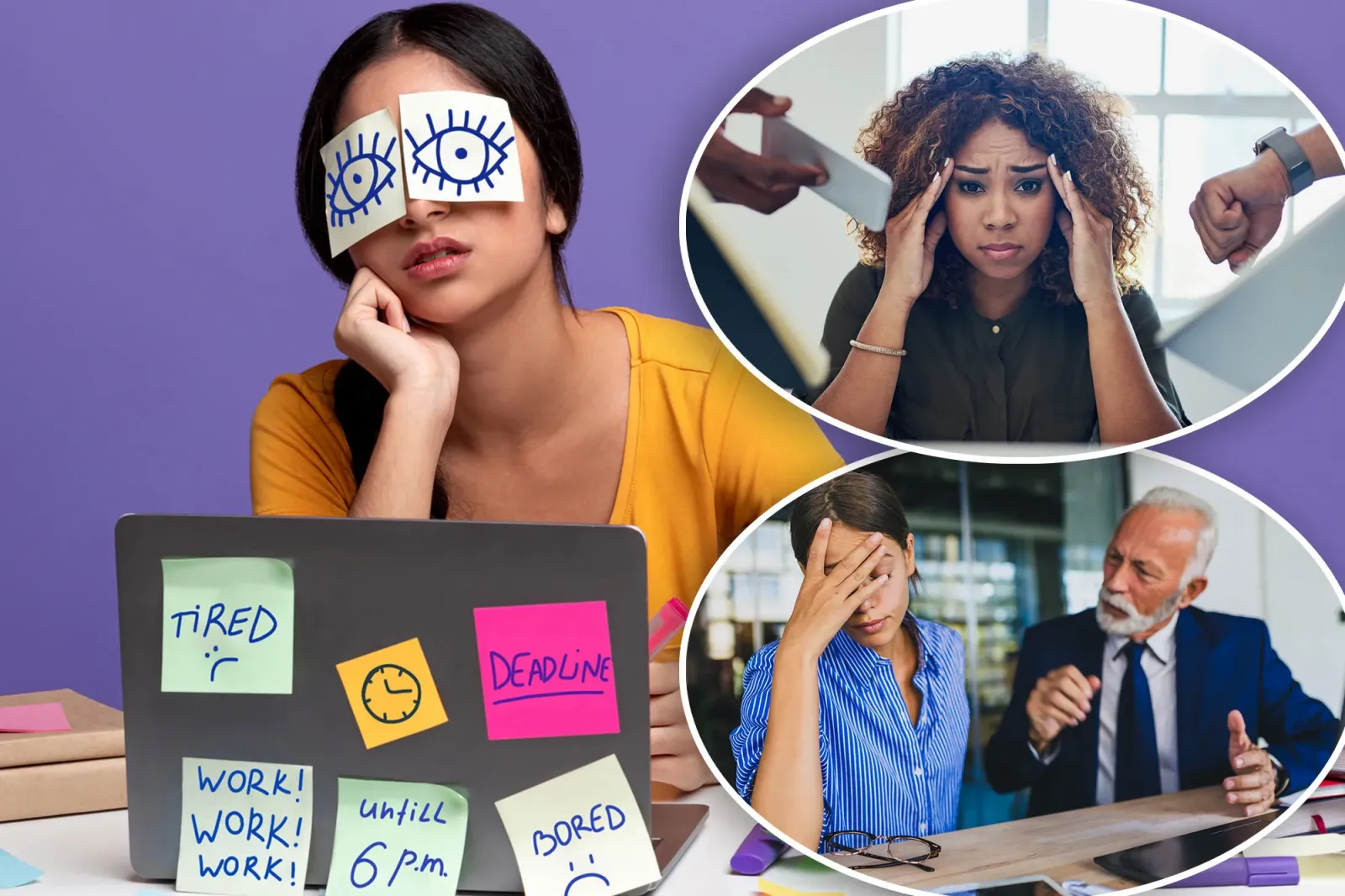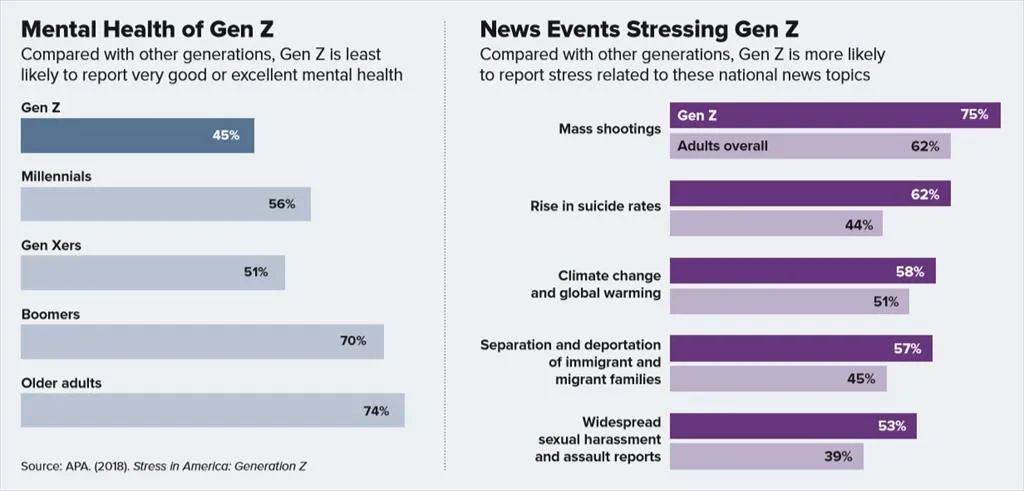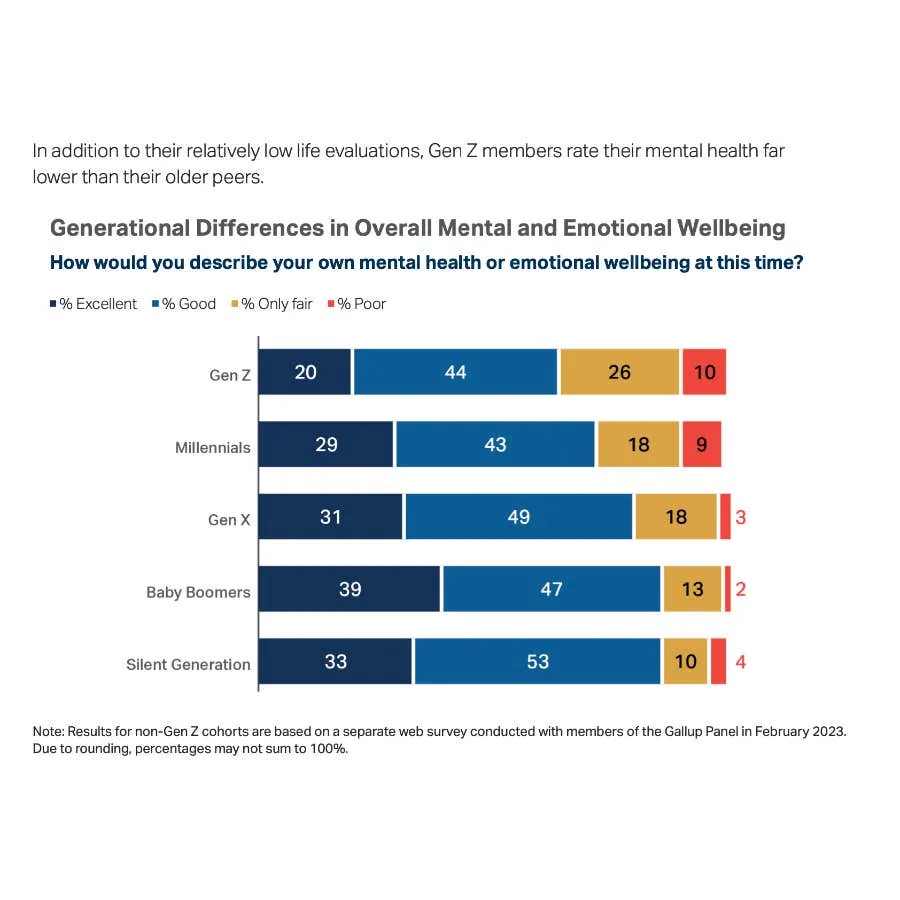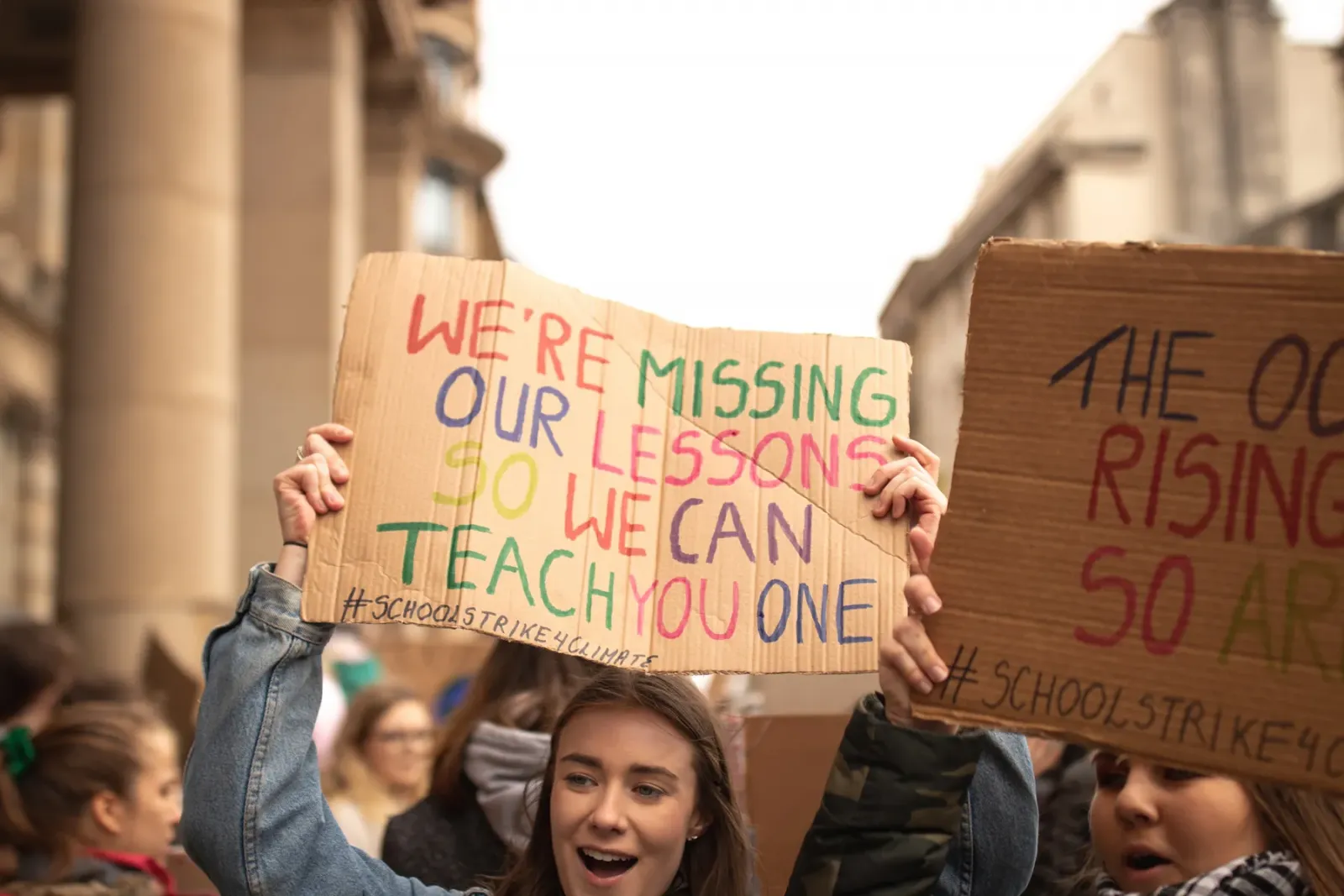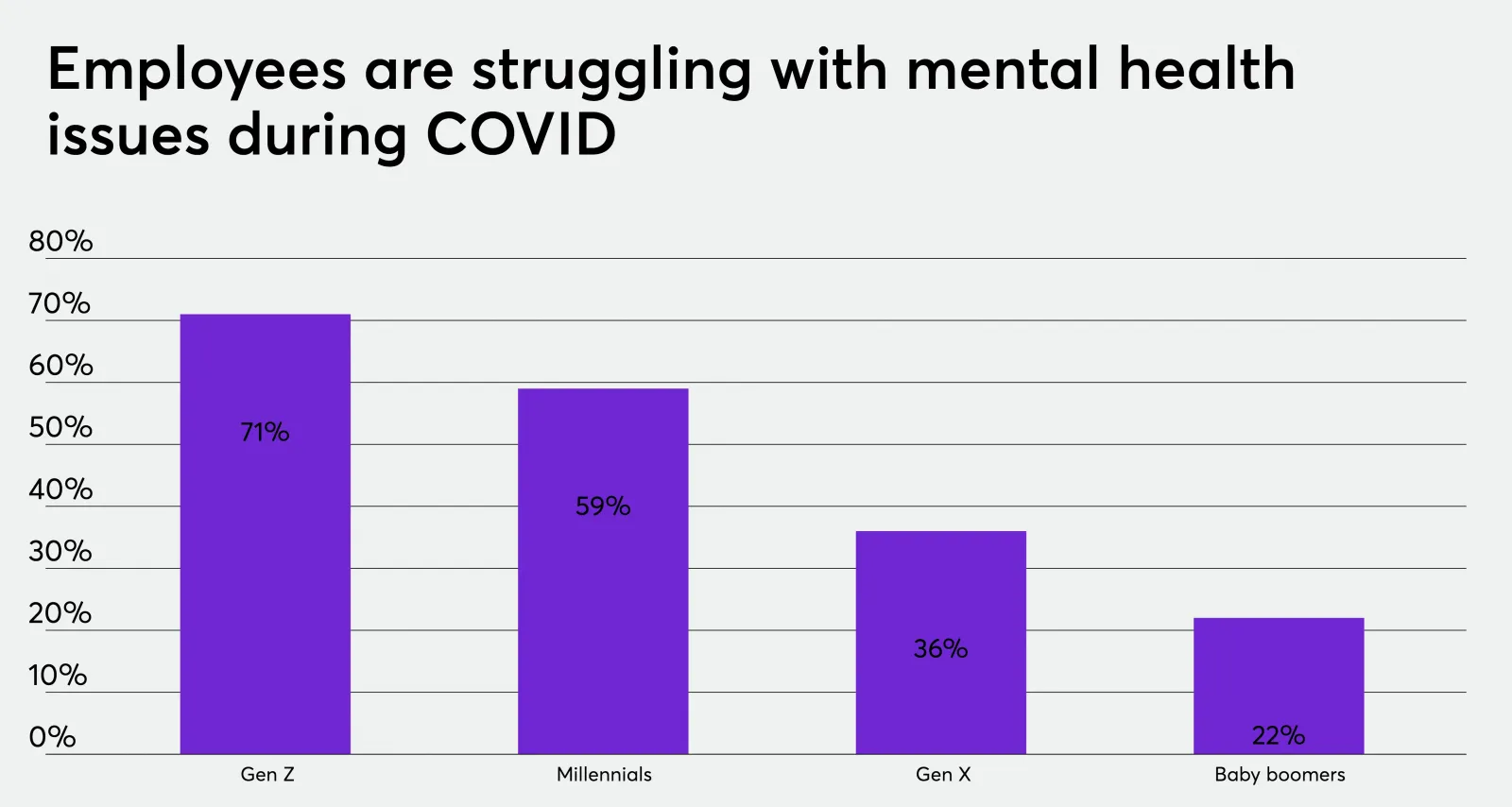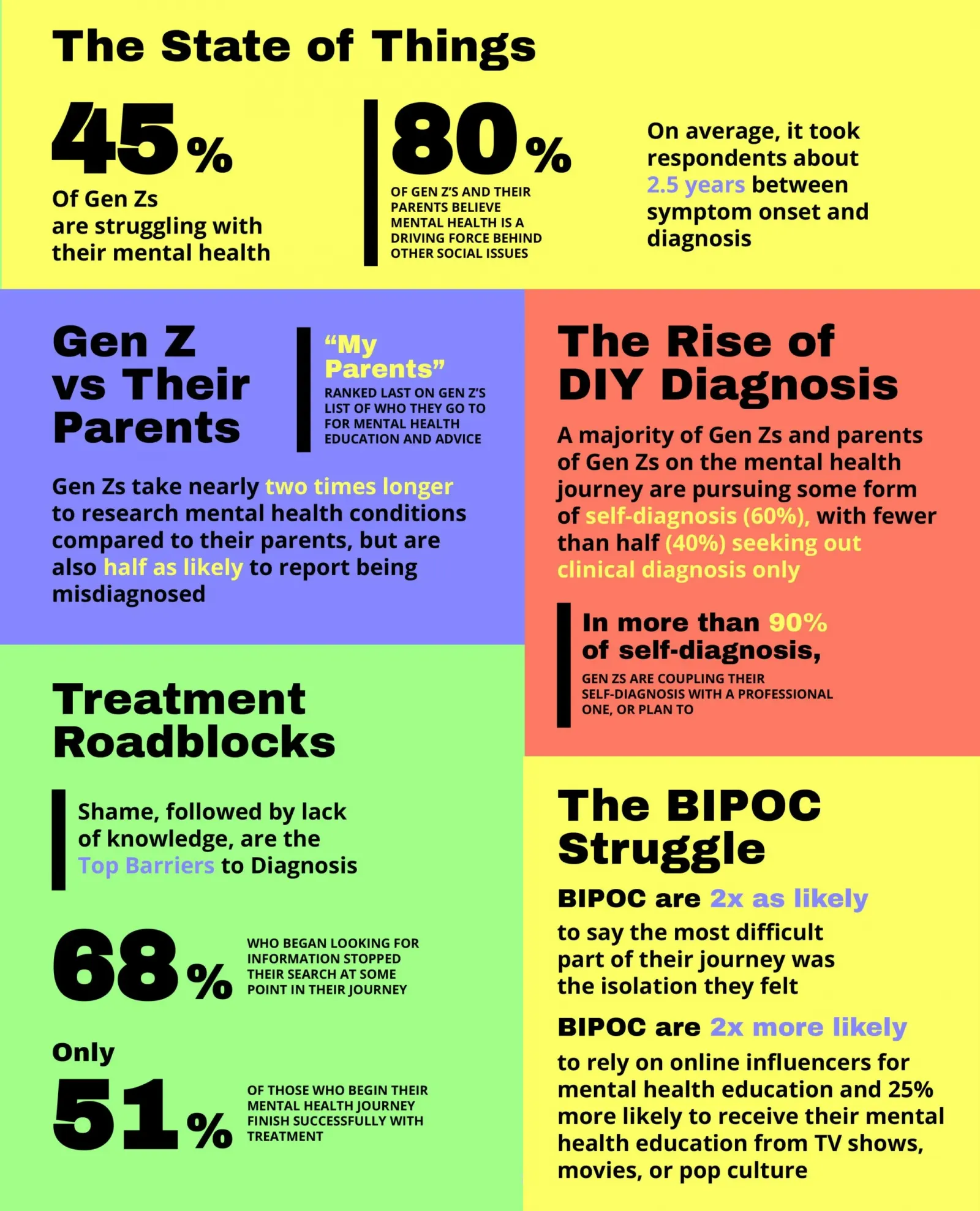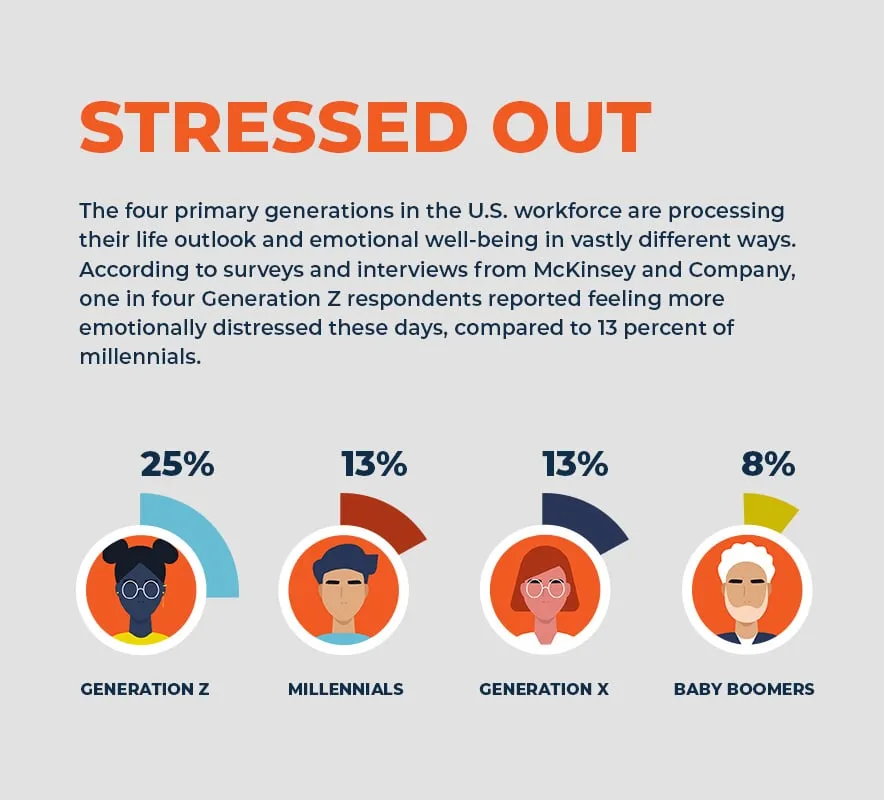As true digital natives, Gen-Z grew up immersed in constant connectivity, social media, and 24/7 access to global information. While this has made them incredibly tech-savvy, it has also contributed to what many experts now call the shocking mental health problem of Gen-Z.
If you’re a parent, teacher, or simply someone who cares about a young person in this age group, you might be wondering: Why is Gen-Z struggling with mental health so much more than previous generations? And what can we actually do to help?
Recent studies show that Gen-Z is facing rising levels of anxiety, depression, and burnout — often at earlier ages and with more intensity than Millennials or Gen X. This spike in mental health issues in Gen Z is tied to several cultural stressors, including social media’s impact on mental health, academic pressure, economic uncertainty, and even climate anxiety. The shutdowns during the COVID-19 pandemic only deepened their emotional isolation, fueling a rise in Gen Z loneliness and disconnection.
In this blog, we’ll break down the most common mental health problems in Gen-Z, explain how they differ from other generations, explore why therapy for Gen-Z is both more accepted and more complex, and offer practical strategies for improving mental health awareness in youth today.
1. Who Is Gen Z?
Defined by the Pew Research Center as individuals born between 1997 and 2012, Generation Z is growing up in a world radically different from previous generations. They’re the first true digital natives — raised in an age of smartphones, streaming, and social media — and they’re also the most racially and ethnically diverse generation in U.S. history.
Gen Z is often described as open-minded, socially aware, and deeply engaged in global issues. They are more civic-minded and tolerant than their predecessors. However, despite their progressiveness, this generation is grappling with a shocking mental health problem that is unlike anything seen before.
While Gen Z is more likely to speak up about emotional challenges and seek help, they are also more prone to mental health issues that previous generations may not have encountered on this scale. The youth mental health crisis is intensifying, and the demand for therapy for Gen Z has never been greater.
2. The Shocking Mental Health Problem of Gen-Z
According to a recent report by the American Psychological Association, 90% of Gen-Z young adults reported feeling both psychological and physical stress in the past year. This is the highest rate of stress ever recorded in the APA’s history, signaling a mental health emergency.
Compared to Millennials or Gen X, Gen-Z is more likely to report depression, anxiety, burnout, and even engage in self-harm. In fact, when comparing Gen Z vs Millennials' mental health, the younger cohort is showing earlier, more severe, and more frequent symptoms.
So, why is Gen-Z struggling with mental health at such alarming rates? Let’s explore some of the biggest contributing factors.
2.1 Anxiety Fueled by Screens
Anxiety has emerged as one of the most common mental health issues in Gen Z, and social media is one of the driving forces behind it. According to the National Institutes of Health, 31.9% of U.S. adolescents experience some form of anxiety disorder.
Many Gen-Zers spend hours scrolling through curated lives and unrealistic body standards on platforms like Instagram and TikTok. This can lead to:
-
Sleeplessness
-
Restlessness
-
Loneliness
-
Dependence
-
Feelings of inadequacy
For many parents, it’s easy to overlook the mental impact of social media, especially if phone usage seems harmless. But for Gen Z, their phones are often a constant source of comparison, pressure, and distraction. Understanding this dynamic is crucial for building mental health awareness in youth and encouraging healthy screen habits.
2.2 School Stress and Burnout
While school has always been a source of pressure, Gen Z faces a uniquely intense form of academic stress. Post-pandemic, students have returned to classrooms with learning loss, social anxiety, and mounting pressure to catch up.
Common stressors include:
-
High-stakes testing
-
Bullying and social exclusion
-
Social media comparisons
-
Unrealistic academic expectations
Many students now associate school not just with education, but with burnout and anxiety. This is a key factor in the mental health statistics of Gen Z, and it’s one that families, educators, and policy makers need to address urgently.
2.3 Depression: A Growing Epidemic Among Gen Z
Depression among Gen Z has risen at alarming rates. In fact, suicide — often linked to untreated depression — has increased by nearly 30% since 2006 among teens and young adults.
Key factors contributing to this crisis include:
-
Housing and food insecurity
-
Poverty
-
Family instability
-
Digital isolation
Even Gen-Zers who aren't directly impacted by these issues can experience depression due to chronic social comparison, low self-worth, and emotional overload from constant news exposure.
What are the most common mental health issues in Gen Z?
Depression, anxiety, burnout, self-harm, and substance abuse top the list.
Symptoms to watch for include:
-
Fatigue
-
Loss of interest in hobbies
-
Isolation
-
Irritability
-
Trouble sleeping
-
Changes in appetite
-
Thoughts of self-harm
If your child is exhibiting any of these signs, seek professional help. Therapy for Gen Z — especially when started early — can significantly improve outcomes.
2.4 Agoraphobia and Fear of the Outside World
Another rising concern among Gen-Z is agoraphobia — the fear of being in public spaces or situations where escape feels difficult. This condition, often misunderstood, is becoming more common in an age of school shootings, global unrest, and media-fueled fear.
For Gen Z, whose formative years have been shaped by lockdowns and mass violence, the world can often feel dangerous and unpredictable.
Agoraphobia can lead to:
-
Avoidance of school or public places
-
Social isolation
-
Exacerbated anxiety and depression
If your child expresses fear about leaving home or attending events, don’t dismiss it. Exposure therapy and cognitive behavioral therapy (CBT) can be effective in helping them slowly re-engage with the world.
2.5 Political Tension and Climate Anxiety
What role does climate anxiety play in Gen Z’s mental health?
A big one. According to research published in The Lancet, nearly 70% of Gen-Z youth feel extreme distress about climate change. Many report that it affects their ability to plan for the future.
Add to that the constant barrage of political polarization, social injustice, and rights reversals, and you’ve got a recipe for emotional burnout. Many Gen-Zers feel powerless and overwhelmed by the state of the world — and for good reason.
This sense of helplessness can strain:
-
Family relationships (especially across political lines)
-
Friendships
-
Sense of safety and stability
As a parent or mentor, acknowledging these fears and creating space for open, nonjudgmental conversations can be incredibly healing.
3. Why Is Gen Z Considered the Loneliest Generation?
Despite their digital connectivity, Gen Z reports higher levels of loneliness than any previous generation. In many ways, constant connection has replaced meaningful connection.
Social media often provides the illusion of friendship, but it lacks emotional depth. Without consistent in-person interaction, many Gen-Zers are left feeling isolated, unseen, and misunderstood.
This chronic loneliness contributes to:
-
Increased anxiety
-
Depression
-
Suicidal ideation
To combat this, encourage real-life connection, community involvement, and mental health awareness among peers.
4. The Shocking Health Habits of Gen-Z
They’re often hailed as the most health-conscious generation—more plant-based, more mindful, more vocal about their emotions. But a shocking discovery about Gen Z’s health is starting to change that narrative.
A recent national survey by the Cleveland Clinic uncovered some surprising trends about the physical and mental health practices of Gen Z men (ages 18 to 26). While they’re more open to mental health care than previous generations, many are falling behind when it comes to basic physical health habits—and it could have serious long-term consequences.
4.1 Gen Z Skipping Physical Checkups at Alarming Rates
According to the survey, nearly 40% of Gen Z men don’t have a primary care physician (PCP). Even more troubling: a large number have never had their blood pressure, cholesterol, or body mass index checked—key health indicators that can reveal early signs of disease.
While 61% of Gen Xers and Baby Boomers report going to annual physicals, only 32% of Gen Z and Millennial men said the same. That gap matters—especially as colorectal and prostate cancer rates are rising among younger adults. Regular checkups help identify risk factors early, when many conditions are most treatable.
4.2 Replacing Doctors with TikTok and Google
Another insight? Many Gen Zers are skipping the doctor entirely and turning to social media or search engines for medical advice. A staggering 33% of Gen Z men said they rely on social platforms like TikTok or Instagram to find health info—compared to just 5% of Boomers.
This shift might explain part of the shocking mental health problem of Gen-Z: while they’re quick to self-diagnose or crowdsource advice, they’re slower to develop relationships with medical professionals who could offer long-term preventive care.
4.3 Rising Health Risks, Rising Fear
Ironically, despite skipping checkups, 87% of men across all age groups said they were worried about how today’s habits might affect their future health. Among Gen Z, there's a disconnect: many admit to feeling anxious about their health, but fewer take action by seeing a doctor regularly.
This is particularly concerning as colorectal cancer rates are rising among adults under 45. Yet, only 20% of people aged 45–49 were up to date with recommended screenings in 2021. Prostate cancer screenings are also woefully underutilized, with nearly 700,000 American men still unscreened.
4.4 Vaping and Smoking: A Troubling Trend
The survey also looked at vaping and smoking behaviors across generations. Only 43% of Gen Z and Millennial men reported avoiding both, compared to 60% of older men.
Younger adults aged 18–24 are more likely to vape, while those aged 45+ are more likely to smoke traditional cigarettes. Both behaviors carry serious health risks and could exacerbate long-term issues Gen Z may not yet fully understand.
4.5 One Bright Spot: Gen Z and Mental Health
If there’s one area where Gen Z shines, it’s mental health awareness. Nearly 60% of Gen Z and Millennial men reported seeking professional help for emotional distress—compared to just over 50% of Boomers and Gen Xers.
This reflects a broader cultural shift: stigma around mental illness is declining, especially among younger adults. Topics like Gen Z depression and anxiety, Gen Z trauma, and burnout are now openly discussed across social platforms, helping more people feel validated and willing to seek support.
4.6 Why the Shift in Health Habits?
So, why is Gen Z struggling with mental health and physical self-care? There are several possible reasons:
-
Digital-first thinking: With easy access to information, Gen Z may assume they can self-manage or diagnose themselves online.
-
Healthcare access issues: Many young adults lack consistent insurance or feel that traditional healthcare systems are outdated.
-
Low perceived risk: Like many young people, Gen Z tends to feel invincible—until a crisis hits.
-
Higher mental health prioritization: They may be more focused on emotional well-being than routine physical care, especially in the wake of the pandemic.
5. What the Future Holds for Gen Z: Hope, Healing, and New Possibilities
While the shocking mental health problem of Gen-Z has raised serious concerns, there are also powerful reasons to be hopeful. Thanks to the growing visibility of emotional wellness, the decline of stigma, and an expansion in mental health care access, Gen Z may be the first generation to fully reshape how society approaches mental well-being.
One major breakthrough is the rise of telehealth and virtual therapy for Gen Z. With cost often acting as a barrier to care, digital mental health services are making support more affordable, flexible, and stigma-free. Whether it’s a therapy app, a Zoom session with a licensed counselor, or anonymous chat-based support, Gen Z now has more accessible mental health resources than any generation before.
Teletherapy is also bridging the gap for individuals living in healthcare deserts, including rural or underserved communities where in-person providers are scarce. This new digital infrastructure offers hope—not only for treating Gen Z depression and anxiety, but also for more complex issues like substance abuse and trauma recovery.
Beyond access, there’s been a cultural shift as well. Employers are recognizing the importance of mental health benefits, offering things like mental health days, therapy reimbursements, and free access to digital wellness platforms. And government-funded services, like the national 988 Suicide & Crisis Lifeline, have created simpler ways to get immediate help—anytime, anywhere.
Crucially, older generations are starting to listen. Conversations around mental health awareness in youth are no longer confined to TikTok or activist circles—they’re happening at school board meetings, in the workplace, and at dinner tables.
The road ahead isn’t without challenges. But Gen Z is showing the world that being vulnerable is a strength, not a weakness. By breaking the silence, embracing therapy, and advocating for one another, they’re building a foundation for lasting change.
And as they continue to speak out and seek support, they’re not just healing themselves—they’re lighting the way for future generations to thrive.
6. What Can Be Done? Strategies for Healing
6.1. Digital Detox and Boundaries
Gen-Z needs education on healthy tech habits, including:
Setting time limits
Turning off notifications
Practicing screen-free mornings and nights
6.2. Improving School and Workplace Support
Institutions can:
Hire more counselors
Provide mandatory mental health education
Encourage flexible work/study schedules
6.3. Encouraging Authentic Conversations
Parents, teachers, and employers must learn to:
Listen without judgment
Validate emotions
Share vulnerability
6.4. Peer Support and Community
Gen-Z thrives in peer-led support groups, clubs, and online communities where they can connect without fear of stigma.
7. The Role of Social Media in Gen-Z’s Mental Health
7.1 TikTok Therapy & Doomscrolling
Gen-Z uses platforms like TikTok and YouTube not just for entertainment but also for mental health education. While this destigmatizes therapy, it also leads to self-diagnosis and misinformation.
7.2 FOMO & the Illusion of Connection
Gen-Z experiences FOMO (Fear of Missing Out) on an epic scale. Seeing others live seemingly perfect lives creates feelings of isolation and inadequacy — despite constant digital interaction.
7.3 Cyberbullying and Harassment
59% of Gen-Z have experienced cyberbullying (Pew).
The anonymity of online platforms intensifies emotional abuse, harassment, and trolling — especially for teens.
Conclusion
The Gen-Z mental health crisis isn’t a phase — it’s a reality rooted in a chaotic world, relentless digital pressure, and unmet emotional needs. But the generation’s willingness to talk, seek help, and demand change is also their greatest strength.
Gen-Z is the therapy generation. They’re resilient, vocal, and fiercely committed to changing the conversation around mental health. With the right support systems — from families, schools, employers, and communities — we can help them heal and thrive.
Maybe you are interested:
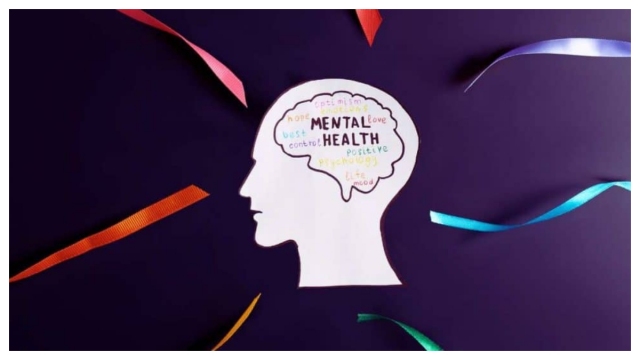
Mental Health Trends 2025 You May Not Know

Dark side of meditation that no one tells you
